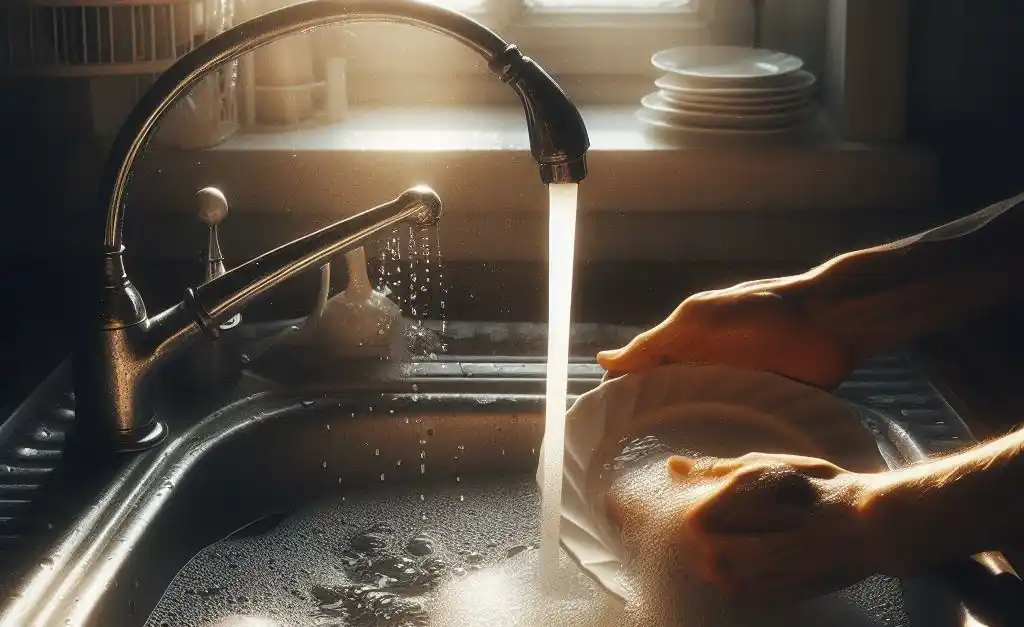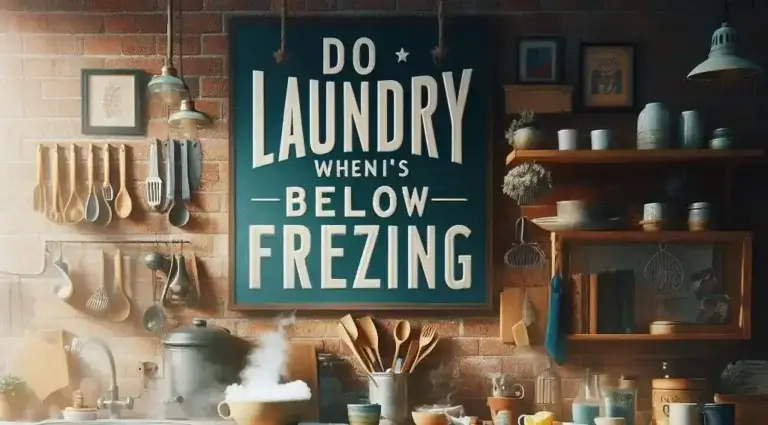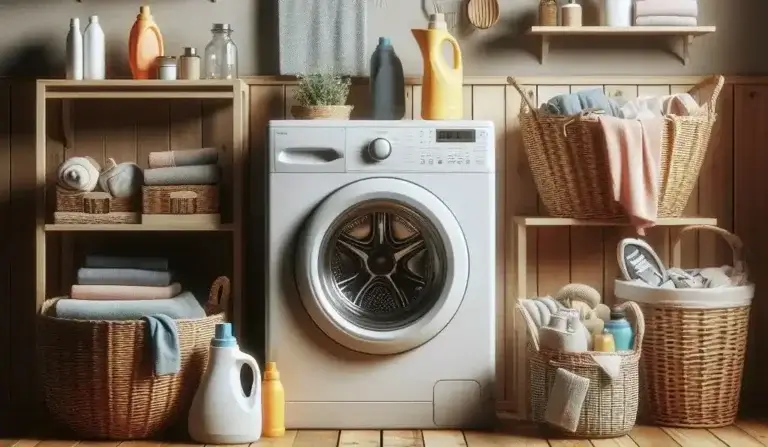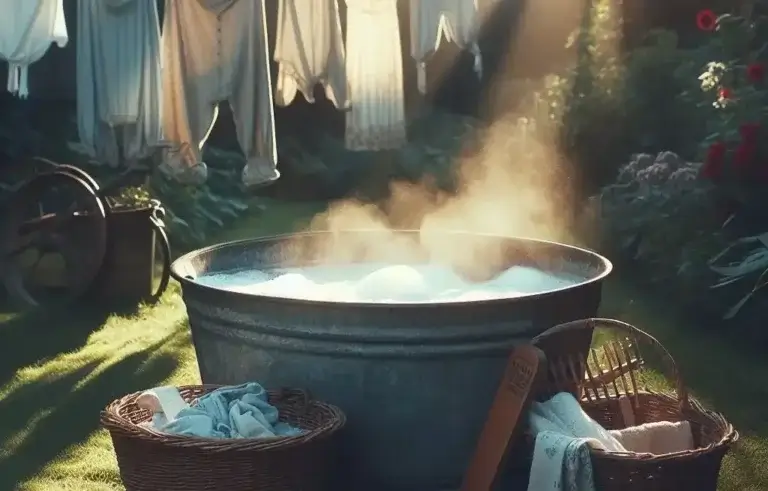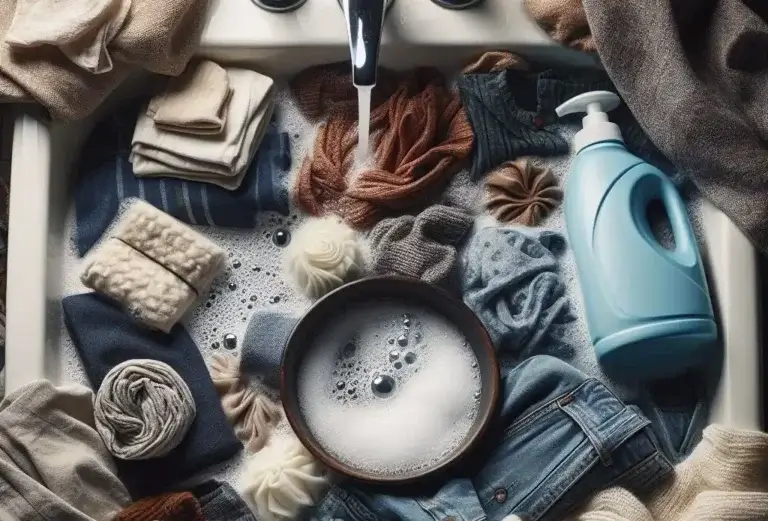What Can I Use to Wash Dishes Instead of Dish Soap?
Are you standing at the sink facing a mountain of dirty dishes but you’ve just realized you’ve run out of dish soap? Dishwashing liquid is incredibly useful for cutting through grease and removing food residue, but there are ways to clean dishes without dish soap in a pinch.
In this comprehensive guide, we will cover what can I use to wash dishes instead of dish soap and learn dish soap alternatives like baking soda, vinegar, lemon, and more. Find out the best substitute based on whether you hand wash or use a dishwasher. Get tips for hard water stains and how to disinfect without chlorine. Plus DIY recipes for homemade dish soap.
Table of Contents
Why Use Dish Soap Alternatives?
Before jumping into the various alternatives, you may wonder why use anything other than regular dish soap. Here are some reasons to try natural dish soap substitutes:
- Avoid toxins: Many conventional dish soaps contain chemicals like ammonia, formaldehyde, phthalates, artificial fragrances, and preservatives. These can be rough on skin and some may have links to health issues with long-term exposure.
- Environmentally friendly: Typical soap formulas often contain petroleum-based ingredients and chemicals that are toxic to marine life. Using natural dish soap alternatives is better for the planet.
- Cost savings: DIY cleaning products are inexpensive to whip up with common pantry staples like baking soda and vinegar. Help cut down on store purchases.
- Have it on hand: You never know when you’ll run out of dish soap. Having go-to backups on hand means you can still wash dishes.
Can You Wash Dishes Without Dish Soap?
Yes, you can clean dishes without using dish detergent. The key is to find an alternative that can cut through oil and grease while removing food particles. Soap helps suspend soils so water can rinse it away – without it you’ll need to soak or scrub.
Make sure to have reasonable expectations if washing loads of crusty pans. While natural options can work well for everyday dishes, very dirty pots and baked-on messes may require the degreasing power of regular dish soap.
Test wash a few dishes first when trying a new method to ensure it works for your needs. You can always rewash with dish detergent if unsatisfied with the results.
Dish Soap Substitutes for Hand Washing Dishes
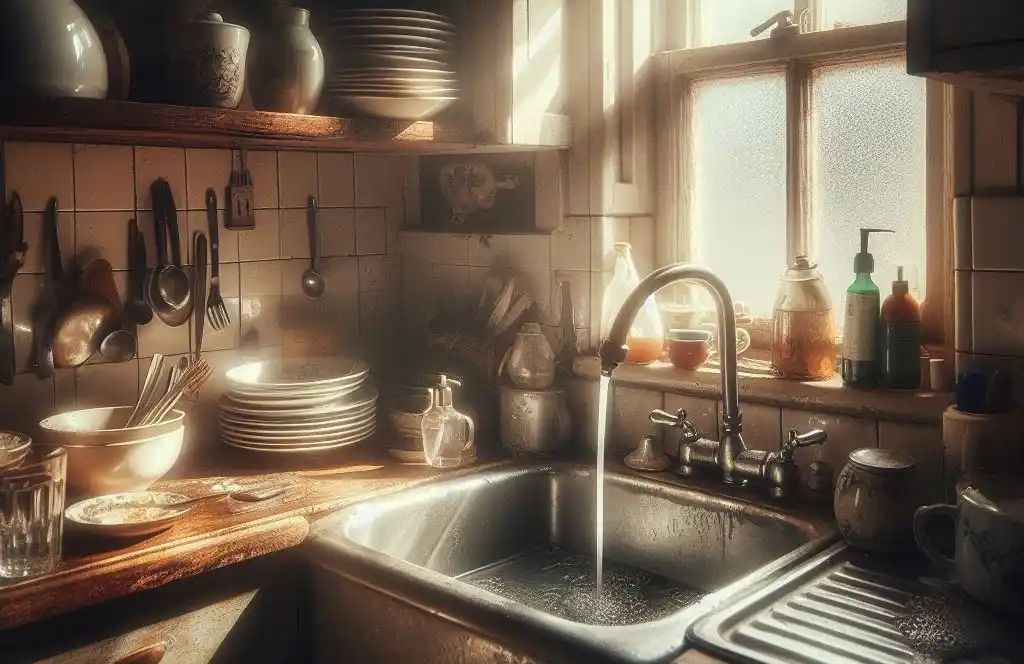
Don’t let a sink full of dishes pile up just because you’ve run out of soap. Try these handy dish soap alternative options to wash dishes by hand:
Baking Soda
Baking soda is mildly abrasive so it’s great for scrubbing dishes. Create a paste by sprinkling some baking soda directly onto a sponge or mixing a few tablespoons with a small amount of water first. Use an old toothbrush for stuck-on gunk.
Rinse thoroughly since leaving baking soda residue can make dishes taste salty. It cuts grease well but doesn’t produce many suds.
White Vinegar
The acetic acid in distilled white vinegar helps dissolve grease and eliminate odors. Pour undiluted vinegar directly onto a sponge and wash dishes as usual, or fill the sink with hot water and 1 cup of vinegar first.
Rinse dishes with cold water after washing to prevent a sour taste. Straight vinegar can leave a lingering aroma so open a window.
Lemon Juice
Freshly squeezed lemon juice makes dishes shine without leaving streaks. It helps remove grease and food residue.
Cut a lemon half and rub it directly onto dishes for extra cleaning power. Or squeeze juice from halves into a basin of warm water and soak plates first before scrubbing.
Salt
Plain table salt works as a gentle abrasive cleaner. Sprinkle some onto a wet sponge or directly onto greasy pans. Let it sit briefly before scrubbing and rinsing. The grains help lift dirt similar to baking soda.
Course kosher salt or sea salt can be more effective than finer grains. Salt is also said to help sanitize dishes. Just avoid overuse near metal surfaces prone to corrosion.
Boiling Water
Boiling water naturally sanitizes and can help loosen dried, caked-on foods when soaked first. Place dirty dishes into a sink filled with very hot water for 10-20 minutes before washing.
Use hot pads when removing to avoid burns. The heat helps lift grease so plates scrub clean with less effort.
Soap Nuts (Reetha Nuts)
Soap nuts are a natural cleaning agent made from the dried fruit of the soapberry tree. Place 4-5 nuts into a small muslin bag and toss into the water to make suds. Agitate against dishes to clean grease. The nuts can be composted after use.
Castile Soap
Castile soap is made from vegetable oils like olive, coconut, and palm. Dilute with water in a spray bottle to make an easy dish soap (5-10 drops per cup of water). Spritz and wipe plates clean without tons of bubbles. It’s also safe for handwashing dishes when further diluted.
Laundry Detergent
In a true pinch, use a small sprinkle of liquid laundry detergent to help clean extremely greasy dishes. It can cut through caked or burnt on foods. Use very sparingly and rinse extremely well. The cleaning agents used on clothes can be harsh on bare hands.
DIY Homemade Dish Soap
Whip up your own non-toxic dish soap so you always have a natural alternative handy. DIY recipes often use ingredients like Sal Suds or castile soap diluted with water and add essential oils. Homemade versions require shaking before each use.
Easy tutorials for making liquid dish soap at home can be readily found online from sources like Apartment Therapy.
Dishwasher Detergent Alternatives
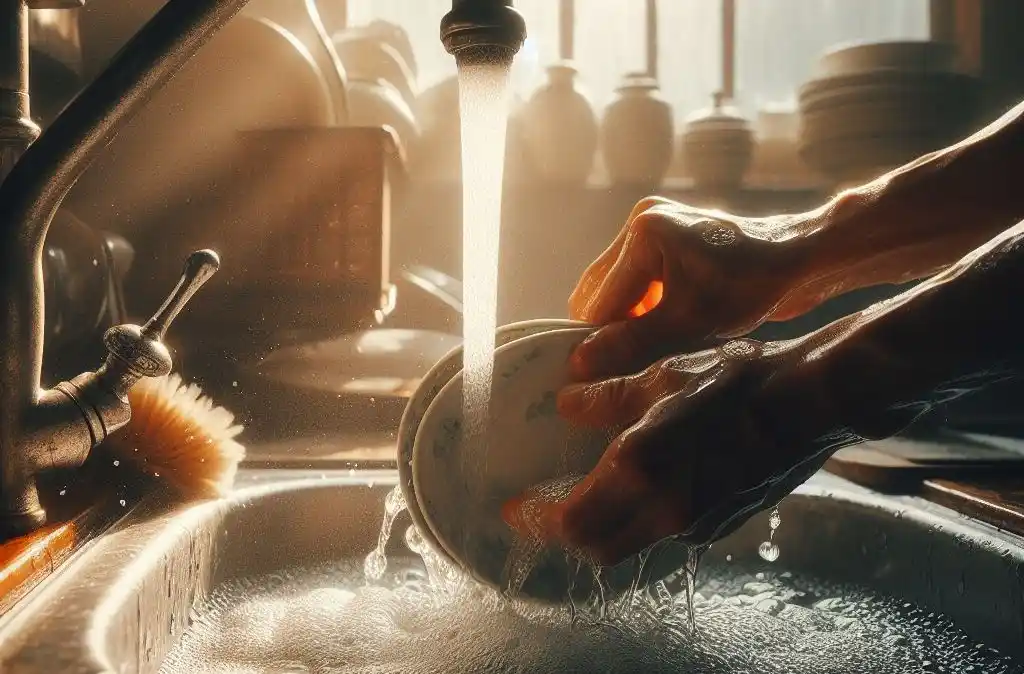
Running out of dishwasher detergent doesn’t mean dirty dishes will pile skywards. You have options to wash a full load without heading to the store.
Baking Soda
Baking soda works well to clean grease and remove odors in the dishwasher too. Simply pour 1⁄4 to 1⁄2 cup of baking soda into the detergent cup and run as normal. Feel free to use loose in the bottom rack for extra cleaning power.
It doesn’t produce bubbles, but the abrasive grains dissolve grease. Dishes come out sparkling clean but be sure to rinse thoroughly. Avoid overuse of handwash-only items.
Borax
Similar to baking soda, borax helps remove stains in the dishwasher through its abrasive qualities. Add a tablespoon to the detergent compartment and wash as normal. Use sparingly and avoid decorative gold rims or hand wash-only pieces.
Rinse thoroughly since borax residue coming into contact with food is not recommended. Stick to occasional use.
Vinegar Rinse Aid
White vinegar naturally removes soap scum, kills bacteria, and prevents hard water spots. Pour 1-2 cups of vinegar into an upright glass on the bottom rack instead of a liquid rinse aid.
The dishwasher dispenses it during the rinse cycle for sparkling results. Cleans well but doesn’t produce many suds to lift soils. Avoid stoneware glazes as acids can damage finishes over time.
Soap Nuts
Reusable soap nuts cut grease in the dishwasher too. Place 5-7 inside a small cloth muslin bag and hook over the bottom rack. Let the fruit release sudsing saponins during the wash cycle to clean dishes without chemicals. Rinse nuts well after each wash and reuse 4-5 times before composting.
Hard Water Rinse Aid Alternatives
Hard water causes annoying spotting and film but commercial rinse aids aren’t eco-friendly. Use lemon juice or vinegar instead:
- Squeeze lemon halves and place upside down in the bottom rack for a natural rinse.
- Pour 1 cup vinegar into a glass upright on the bottom rack.
Tips for Greasy, Burnt-On Messes Without Dish Soap
Baked-on casserole pans and greasy broiler trays can vex anyone facing a mountain of dishes. Try these tips to tackle tough messes sans detergent:
- Soak pots in hot water for 10-20 minutes to loosen foods before scrubbing.
- Spread baking soda paste and let sit overnight before washing.
- Boil water in the pan for 5 minutes then scrub with a salt paste.
- Pour coke into burnt pans and let sit overnight to dissolve gunk before rinsing.
- Sprinkle cream of tartar onto stains in ceramic pans and gently rub with a wet sponge.
- Place messy pans under a running hot tap and let sit a few minutes to loosen debris for an easy scrub.
Sterilizing Dishes Without Bleach
Getting plates squeaky clean is important, but properly sterilizing dishes to remove bacteria is also essential – especially for baby bottles, sippy cups, and teethers.
Chlorine bleach solutions were once the go-to, but bleach releases volatile organics indoors and requires careful handling. Try these natural ways to sanitize dishes instead:
Steam
A dishwasher provides hot water and steam to sanitize baby items, but you can mimic this without soap. Place washed bottles in a large pot and cover with 2-3 inches of water. Bring to a boil for 5 minutes with the lid on.
Lemon Juice
Wipe bottle nipples and pacifiers with lemon juice using a clean cloth. Let sit 5 minutes before rinsing. The acidity kills germs without chemicals.
Vinegar
After washing baby items thoroughly with soap and water, soak for 30 seconds in a solution of 1 tablespoon of white vinegar per 1 quart (4 cups) of cool water. Remove and let air dry on a clean dish rack.
Baking Soda
Make a thick paste of baking soda and water and gently scrub bottles, nipples, and cups. Let sit 3-5 minutes before rinsing thoroughly with clean water. The abrasive grains remove residue while alkalinity kills germs without harsh fumes.
Boiling Water
After washing thoroughly with soap, submerge baby bottles fully in boiling water for 5 minutes, making sure water penetrates nipples, caps, and crevices. Use hot pads to remove safely before air drying on a clean rack.
FAQs: Wash Dishes Instead of Dish Soap
Can I add essential oils to dish soap alternatives?
Yes, adding a couple of drops of antimicrobial oils like lavender, lemon or tea tree boosts cleaning power. Just avoid oils that degrade plastics – like citrus and pine oils with bottles.
Should I dry wipe dishes first before soaking?
It’s smart to scrape large food bits into the trash with a rubber spatula and dry wipe oily surfaces before soaking or washing dishes. This keeps water cleaner and prevents drains from clogging.
Help, my faucet has low pressure. What should I do?
Low water pressure hampers rinsing. Fill clean basins with water in advance for dish dipping instead of struggling with a weak faucet flow while washing. Change worn washers for better pressure.
Ugh, I have hard water stains. What now?
Remove stubborn hard water stains on glassware by soaking 15 minutes in equal parts water and white vinegar. For iron deposits on porcelain, rub with a paste of cream of tartar and water then rinse.
How do you hand-dry dishes without streaks?
Let dishes fully air dry in a drainer rather than wiping to prevent spots. Water beads and evaporates leaving a streak-free shine. If wiping, use a waffle weave cloth in a back-and-forth motion.
Conclusion
Who knew there were so many dish soap substitutions? With a variety of effective options like baking soda, vinegar, lemon, and more, you can successfully wash loads of dishes even if you’ve run out of detergent.
Hopefully, these dishwashing tips give you the confidence to face a mountain of dirty plates using items already in your pantry. Just remember extremely greasy pans may require the degreasing power of true dish soap.
Want to save money by making your own? Whip up an easy homemade dish soap that works using natural ingredients like Sal Suds or Castile soap. Just search for “DIY dish soap” recipes online.
So next time you find yourself fresh out of dish detergent with dishes piled high, take heart. Thanks to these dish soap substitutes, you can wash that mountain without heading to the store!

